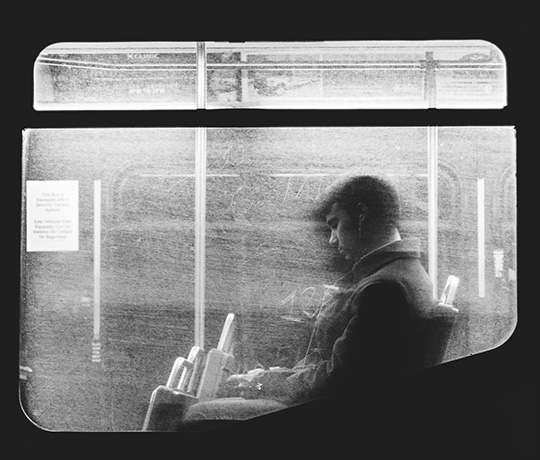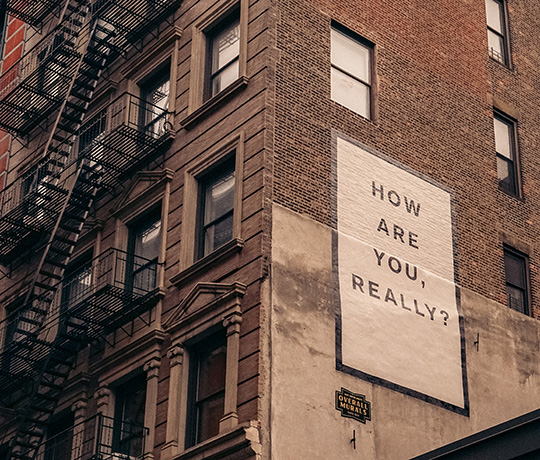As we near R U OK? Day in Australia, Martie Hong talks about his experience feeling lonely and lost at times when taking the leap moving to a new city on his own.

It’s Saturday night in London. And not just any Saturday – it’s a summer Saturday. It means light till 9:30pm. It means pints in the beer garden, live music in the air, and beautiful new faces to meet and flirt with. As a fresh-faced 21 year old who has flown halfway across the world for an internship in Fashion, this is going to be my summer. In fact, this is my year to spread my wings, free from friends and family, and blossom into the fabulous man-about-town I was destined to become.
But in fact, I’m at home. Alone. It’s 6:42pm and I’m already on my second bottle of rose I bought at the local “offie” (two for one!) with nothing but a microwaveable dinner for two to myself, and a re-run of How To Lose A Guy In Ten Days on Channel 4 to look forward to.
I’ve been here five months already, but this has mostly been what my weekends look like – and I think next Saturday is going to be much of the same.
I’m not OK.
You see, that’s the part of moving to a new city that they don’t tell you about. It’s absolutely everything they say it is: it’s transformative, it’s freeing, it’s liberating, and it takes you out of your comfort zone and you learn so much more about life and experience so much more than you would if you stayed in one place all your life. But in-between landing and feeling like Carrie Bradshaw in NYC, there is a period of struggle and adjustment. You’ll feel lost, scared, adrift, aimless, angry at yourself, impulsive… bored. You won’t be OK. And you never really going to know how long that’s going to last. And actually, that’s OK.
If you’re lucky, you may have made a few friends or even acquaintances that are smart enough to ask you the question: “are you OK?”. But for me, I didn’t yet. But luckily I learnt to ask myself that question, and allowed myself to give the answer: “No”.
R U OK? Day – September 10th
Started by an advertising exec in 2009 in memory of his father who died from suicide, R U OK? day is a national day of conversation. Its mission is to teach Australians to meaningfully connect with people around them and support anyone struggling with life.
Suicide among international students have long been a taboo subject within the student community. Being Chinese, I found this was especially so for me – having grown up in a culture that believes in “no pain, no gain”, and that feeling down as an unnecessary sign of weakness. Compounding the issue is that even in 2020, the suicide rate among international students is not well understood. After a string of student suicides in Melbourne in 2019, the government inquiry has finally been commissioned with data due to appear late 2020, giving current healthcare workers zero visibility.
So until systematic change and support is set up, I believe the power lies in individuals. And it starts with self-care. R U OK? champions a four-stage conversation model which I’ve found really useful: 1. Ask. 2. Listen. 3. Encourage Action 4. Check In. It’s designed to be used to reach out to a friend, colleague or family member to help each other connect and feel less lonely, but I’ve found it to be a powerful tool when turned towards yourself too.

Ask. Listen. Encourage Action. Check In.
Moving to a new city brings with it a lot of challenges – and many students come here alone and (seemingly) have to face these challenges alone. You’re in a new world of unfamiliar customs and etiquette. Maybe you aren’t fully fluent in the language yet, but even if you are, there are tricky local accents and slang that take a while to adjust to. You’re removed from your usual support network of friends and family. Most of all, it’s exhausting that everything has to take effort.
Be sure to check in with yourself regularly. Ask yourself, how are you doing? Be honest with yourself – and be prepared that the answer you find might be “I’m not doing OK”. That’s perfectly normal. Don’t brush it away. If that is your answer, it’s time to treat yourself with a bit of empathy and understanding, and allow yourself to feel overwhelmed, lost, or unhappy. Don’t try to sweep it under the carpet or fix it immediately. Honour that feeling, feel the feeling, and then when you’re ready, start finding your way out at a pace that suits you.
4 Ways To Be Kind To Yourself
For me, getting comfortable in a new city took probably 8 months. During this period of adjustment, I tried all sorts of things before I found my place. If you’re feeling the same, you’ll probably try a whole different set of things before you will feel comfortable, but there are a few principles that has helped me and, I hope, will benefit you too:
#1 Find your fun
You’re in a new city – this is the time to embrace the opportunity and allow yourself to open up. Find a hobby that you’ve always wanted to try – for me it was dance classes – and give it a try. Nobody knows you here, so there’s no reason to feel embarrassed (you’ll likely never see them again!). More likely, you’ll discover something you really enjoy, and there’s no better way to make new friends than through a common hobby.
#2 Play your strong suit
Were you in a choir back home? No? Just me? Well, ok. But what’s your version of choir? Did you enjoy basketball? Join a local community team. Do you love gaming? Find a local gaming bar. Love cooking? Do a drop-in cooking class. A Dungeons and Dragons fan? You get the picture… When you’re in a familiar environment, you come out of your shell more and remind yourself that no matter where you are, there are others like you. Start with your comfort zone and expand from there.
#3 Be authentic
It’s easy to try to minimise yourself in order to fit in. That takes way too much effort. Sorry, I’m a trained actor and I don’t even have the energy for that. If you’re talking to someone at a bar or you’ve connected with a new classmate, remember to be yourself. It’ll make the connection so much easier and the conversation will flow much more naturally towards things you find interesting rather than trying to fake a love of sports cars. Don’t forget, if you hit it off, you’ll have to see them many times again in the future – do you really want to keep faking a love of V8 engines?
#4 Be your own cheerleader
This one is probably the hardest for all my fellow asians out there. There is a time to push yourself, and there is a time to know to back off and be kind to yourself. Be your own best friend. If you’re feeling depleted and you just need to take a weekend to lay low and play Switch all weekend, that’s OK. If after a couple of rounds with your new friends and you feel like it’s time to go home to recharge, that’s OK too. Imaging you are your own best friend and they’re coming to you asking for help. What would you say? Be your own cheerleader, you own confident and know when to push and when to take a breath.

Just Remember… You’ll Be OK
When all is said and done, moving overseas by myself was probably one of the best decisions of my life. It gave me space to reinvent, redefine and rebuild myself without the baggage of my friends and family’s pre-conceived ideas of me, and most of all, I learnt to be my own champion. But in amongst it, I also learnt what it was like to be lonely, afraid, and disconnected from the world. Most of all, I learnt that it was OK not to be OK. The key was to treat myself with empathy and patience.
I hope that by sharing my story, it will help some people feel seen and maybe for those who are struggling, it will give you some hope knowing that you are not alone in what you are feeling.
If you are struggling to cope or feel like you don’t have anyone to turn to, don’t be shy about reaching out for help. Your university or learning institute will have access to some excellent guidance and support resources.
Alternatively, if it’s a friend who you suspect is not coping or feeling down, take R U OK?’s lead and check in on them. It only takes a question.
If you are experiencing emotional distress, reach out to LifeLine or call 000 if your life is in danger.
To learn more about the work of R U OK?, visit https://www.ruok.org.au.





















